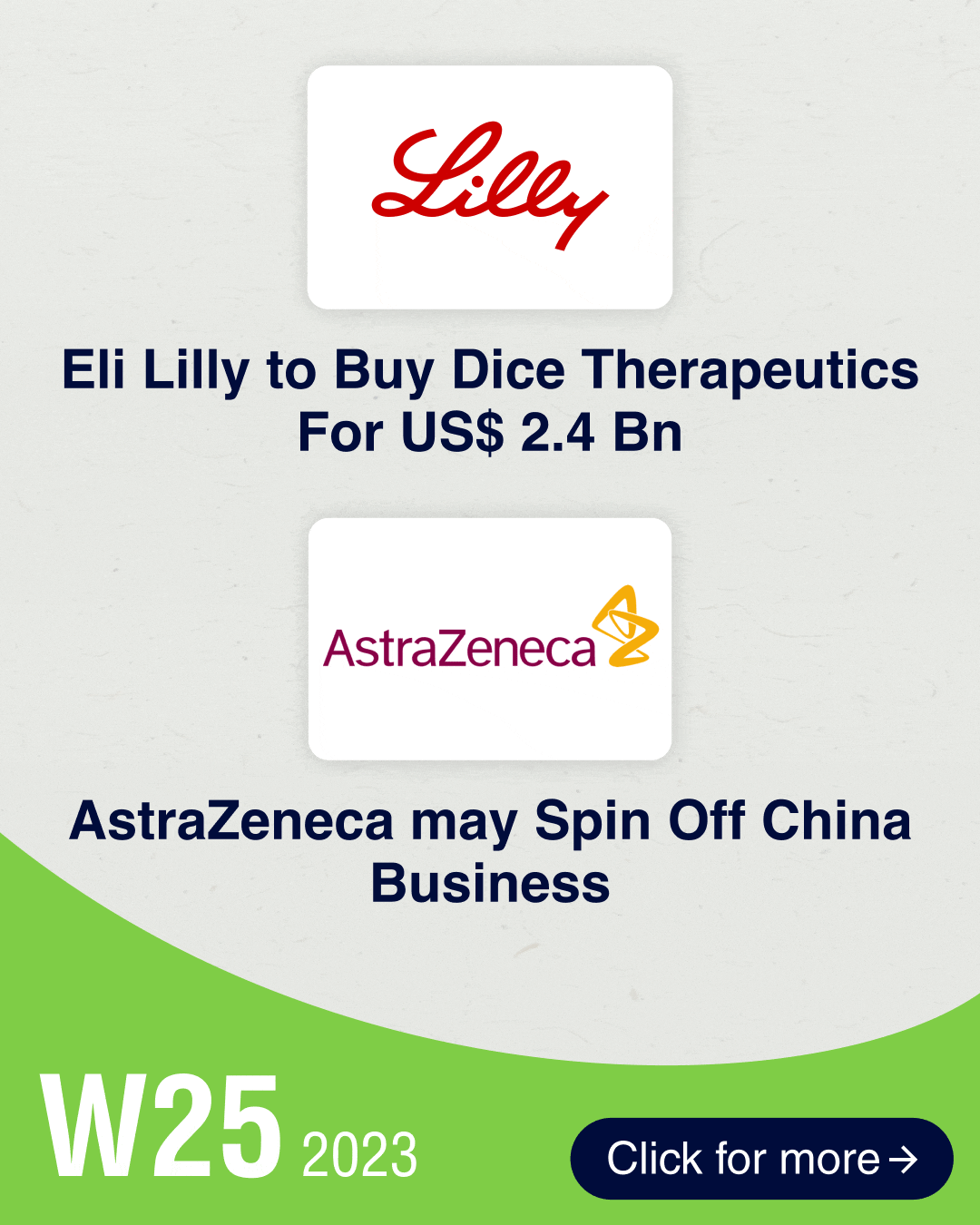
By PharmaCompass
2023-06-22
Impressions: 1,562 Article || 2 Video
In pharma news this week, Eli Lilly is all set to acquire Dice Therapeutics for around US$ 2.4 billion, while AstraZeneca is reportedly considering spinning off its China business.
There was more outcry over provisions of the Inflation Reduction Act (IRA) in the US. After Merck and the US Chamber of Commerce, Bristol Myers Squibb (BMS), lobby group PhRMA and two other bodies have sued the government over this new legislation.
In approvals, Roche’s blood cancer therapy Columvi has received FDA’s accelerated approval for the treatment of relapsed or refractory diffuse large B-cell lymphoma (DLBCL). Pfizer’s Talzenna has bagged a broader approval as compared to Astra and Merck’s Lynparza for treating metastatic castration-resistant prostate cancer (mCRPC). Agepha Pharma has gained FDA approval for Lodoco as the first anti-inflammatory atheroprotective cardiovascular treatment. FDA has also approved Lilly and Boehringer’s Jardiance and Synjardy to treat children aged 10 years and older with type 2 diabetes.
The furore over contaminated cough syrups continued, as Nigeria issued an alert. The World Health Organization (WHO) has identified 20 contaminated cough syrups originating from India and Indonesia that have been linked to nearly 300 deaths worldwide.
A CDC panel of external experts has recommended a limited rollout of Pfizer and GSK’s RSV vaccines to prevent severe infections in older adults. AbbVie’s drug Skyrizi has met with success in a late-stage trial on adults with moderate to severe active ulcerative colitis. And Merck’s Keytruda combo helped improve progression-free survival in patients with HER2-positive gastric or gastroesophageal junction adenocarcinoma in a late-stage trial.
Lilly to buy Dice Therapeutics for US$ 2.4 billion; Astra may spin off China biz
Eli Lilly will acquire Dice Therapeutics for around US$ 2.4 billion in order to bolster its immunology pipeline. The deal will grant Lilly access to Dice’s experimental oral pill for treating psoriasis along with its other pipeline drugs.
Astra plans to spin off China business: AstraZeneca is reportedly considering spinning off its China business and listing it either in Hong Kong or Shanghai as a strategic move to shield itself against increasing geopolitical tensions, a report in Financial Times said. AstraZeneca has declined to comment on the matter.
After Merck and US Chamber of Commerce, BMS, PhRMA, two other bodies sue US govt over IRA
After Merck, BMS has become the second major drugmaker to file a lawsuit against the US government over a provision in the IRA that enables Medicare to negotiate drug prices. In its lawsuit, BMS has argued that the “government-controlled scheme” violates the drugmakers’ constitutional rights and is “bad for innovation.”
Leading industry lobby group — the Pharmaceutical Research and Manufacturers of America (PhRMA) — and two other organizations (National Infusion Center Association and the Global Colon Cancer Association) are also suing the US government over the IRA. Last week, the US Chamber of Commerce had sued the government over the price-cutting plan.
Biden picks former health secretary to lead CDC: US President Joe Biden has picked Mandy Cohen, former health secretary of North Carolina, for the role of Director of the Centers for Disease Control and Prevention (CDC). Cohen will replace Rochelle Walensky.
Roche’s Columvi receives FDA’s accelerated nod for diffuse large B-cell lymphoma
Roche’s blood cancer therapy Columvi (glofitamab) has received FDA’s accelerated approval, making it the second treatment for patients with relapsed or refractory diffuse large B-cell lymphoma (DLBCL) who have undergone multiple lines of systemic therapy. In May, AbbVie and Genmab’s Epkinly became the first therapy to treat the condition.
Pfizer’s Talzenna snags broader prostate cancer nod: FDA has approved Pfizer’s Talzenna, in combination with Pfizer-Astellas’ Xtandi, to treat metastatic castration-resistant prostate cancer (mCRPC) that has homologous recombination repair (HRR) gene mutations. This approval gives Talzenna an edge over AstraZeneca and Merck’s Lynparza (for use with Johnson & Johnson’s Zytiga) as that drug combo only covers patients whose tumors have BRCA mutations.
Agepha’s cardiovascular treatment bags FDA nod: Slovakia-based Agepha Pharma has gained FDA approval for Lodoco (colchicine) as the first anti-inflammatory atheroprotective cardiovascular treatment. This once-daily tablet, when used with statins, has shown reduction in the risk of myocardial infarction, stroke, coronary revascularization and cardiovascular death in adults with atherosclerotic disease or multiple risk factors for cardiovascular disease.
Lilly, Boehringer’s type 2 diabetes drugs for kids: FDA has approved Eli Lilly and Boehringer Ingelheim’s drugs – Jardiance (empagliflozin) and Synjardy (empagliflozin and metformin hydrochloride) – to improve blood sugar control in children aged 10 years and older with type 2 diabetes. The drugs are already approved for adults with type 2 diabetes.
WHO identifies 20 syrups that caused 300 deaths, links origin to India, Indonesia
Toxic meds from India are back in the news. WHO has identified 20 contaminated cough syrups linked to nearly 300 deaths worldwide, and all of them originated from India and Indonesia. The toxic drugs, including cough medicine, paracetamol and vitamins, were manufactured by 15 different companies in these two countries.
Meanwhile, Gambian authorities have made it mandatory for all pharmaceutical products from India to be inspected and tested prior to shipment from July 1. And the Nigerian drug control agency has issued an alert over “sub-standard” or toxic oral paracetamol and a cough medicine manufactured by Mumbai and Punjab-based companies in India. Moreover, authorities in Cameroon suspect a cough syrup manufactured in India has led to the deaths of around a dozen children.
CDC panel recommends limited rollout of GSK, Pfizer’s RSV vaccines in older adults
A panel of external experts to the Centers for Disease Control and Prevention (CDC) has recommended a limited rollout of Pfizer’s Abrysvo and GSK’s Arexvy vaccines to prevent severe RSV infections in older adults.
In a late-stage trial, Arexvy has demonstrated strong, long-term protection against RSV-related lower respiratory tract disease and severe disease over two complete RSV seasons in older adults, including among participants with underlying medical conditions.
AbbVie’s Skyrizi successful in ulcerative colitis trial: AbbVie’s blockbuster drug Skyrizi (risankizumab) has met with success in a late-stage trial on adults with moderate to severe active ulcerative colitis.
Lilly’s migraine drug fails to best Pfizer’s Nurtec ODT: Eli Lilly’s biologic migraine drug Emgality (galcanezumab) has failed to outperform Pfizer’s competing oral drug Nurtec ODT (rimegepant) in reducing monthly migraine days by 50 percent or more in a head-to-head trial. Lilly, however, said Emgality demonstrated clinically meaningful efficacy and safety in the three-month study.
Astra discontinues asthma drug trial: AstraZeneca has halted a phase 2 trial for the asthma medication elarekibep after data from a non-clinical toxicology study revealed inflammation-related lung tissue damage.
Keytruda shows promising results in gastric cancer: Merck’s blockbuster drug Keytruda, in combination with Roche’s Herceptin and chemotherapy, improved progression-free survival in patients with HER2-positive gastric or gastroesophageal junction adenocarcinoma in a late-stage trial. The benefits were observed only in patients with PD-L1 positive tumors.
Meanwhile, in a separate late-stage trial, Keytruda failed to prevent tumor recurrence in patients with resectable gastric and gastroesophageal junction adenocarcinoma.
Partial hold on Mersana’s ovarian cancer drug trials: FDA has issued a partial clinical hold, pausing enrollment in two studies on Mersana Therapeutics’ experimental ovarian cancer drug – upifitamab rilsodotin – following the deaths of five patients due to bleeding events.
FDA has also halted a phase 2 trial of Arcellx and partner Gilead Sciences’ cell therapy for multiple myeloma following the death of a trial patient.The PharmaCompass Newsletter – Sign Up, Stay Ahead
Feedback, help us to improve. Click here
Image Credit : Phisper Infographic by PharmaCompass license under CC BY 2.0
“ The article is based on the information available in public and which the author believes to be true. The author is not disseminating any information, which the author believes or knows, is confidential or in conflict with the privacy of any person. The views expressed or information supplied through this article is mere opinion and observation of the author. The author does not intend to defame, insult or, cause loss or damage to anyone, in any manner, through this article.”







